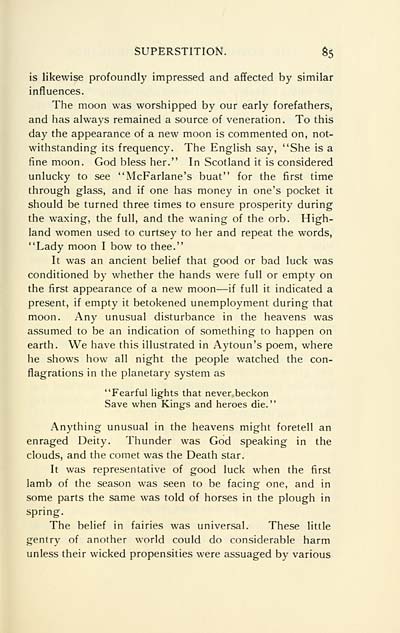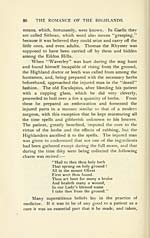Download files
Complete book:
Individual page:
Thumbnail gallery: Grid view | List view

SUPERSTITION. 85
is likewise profoundly impressed and affected by similar
influences.
The moon was worshipped by our early forefathers,
and has always remained a source of veneration. To this
day the appearance of a new moon is commented on, not-
withstanding its frequency. The English say, "She is a
fine moon. God bless her." In Scotland it is considered
unlucky to see "McFarlane's buat" for the first time
through glass, and if one has money in one's pocket it
should be turned three times to ensure prosperity during
the waxing, the full, and the waning of the orb. High-
land women used to curtsey to her and repeat the words,
"Lady moon I bow to thee."
It was an ancient belief that good or bad luck was
conditioned by whether the hands were full or empty on
the first appearance of a new moon — if full it indicated a
present, if empty it betokened unemployment during that
moon. Any unusual disturbance in the heavens was
assumed to be an indication of something to happen on
earth. We have this illustrated in Aytoun's poem, where
he shows how all night the people watched the con-
flagrations in the planetary system as
"Fearful lights that never beckon
Save when Kings and heroes die."
Anything unusual in the heavens might foretell an
enraged Deity. Thunder was God speaking in the
clouds, and the comet was the Death star.
It was representative of good luck when the first
lamb of the season was seen to be facing one, and in
some parts the same was told of horses in the plough in
spring.
The belief in fairies was universal. These little
gentry of another world could do considerable harm
unless their wicked propensities were assuaged by various
is likewise profoundly impressed and affected by similar
influences.
The moon was worshipped by our early forefathers,
and has always remained a source of veneration. To this
day the appearance of a new moon is commented on, not-
withstanding its frequency. The English say, "She is a
fine moon. God bless her." In Scotland it is considered
unlucky to see "McFarlane's buat" for the first time
through glass, and if one has money in one's pocket it
should be turned three times to ensure prosperity during
the waxing, the full, and the waning of the orb. High-
land women used to curtsey to her and repeat the words,
"Lady moon I bow to thee."
It was an ancient belief that good or bad luck was
conditioned by whether the hands were full or empty on
the first appearance of a new moon — if full it indicated a
present, if empty it betokened unemployment during that
moon. Any unusual disturbance in the heavens was
assumed to be an indication of something to happen on
earth. We have this illustrated in Aytoun's poem, where
he shows how all night the people watched the con-
flagrations in the planetary system as
"Fearful lights that never beckon
Save when Kings and heroes die."
Anything unusual in the heavens might foretell an
enraged Deity. Thunder was God speaking in the
clouds, and the comet was the Death star.
It was representative of good luck when the first
lamb of the season was seen to be facing one, and in
some parts the same was told of horses in the plough in
spring.
The belief in fairies was universal. These little
gentry of another world could do considerable harm
unless their wicked propensities were assuaged by various
Set display mode to: Large image | Transcription
Images and transcriptions on this page, including medium image downloads, may be used under the Creative Commons Attribution 4.0 International Licence unless otherwise stated. ![]()
| Early Gaelic Book Collections > Ossian Collection > Romance of the Highlands > (115) |
|---|
| Permanent URL | https://digital.nls.uk/81817005 |
|---|
| Description | Selected books from the Ossian Collection of 327 volumes, originally assembled by J. Norman Methven of Perth. Different editions and translations of James MacPherson's epic poem 'Ossian', some with a map of the 'Kingdom of Connor'. Also secondary material relating to Ossianic poetry and the Ossian controversy. |
|---|
| Description | Selected items from five 'Special and Named Printed Collections'. Includes books in Gaelic and other Celtic languages, works about the Gaels, their languages, literature, culture and history. |
|---|

